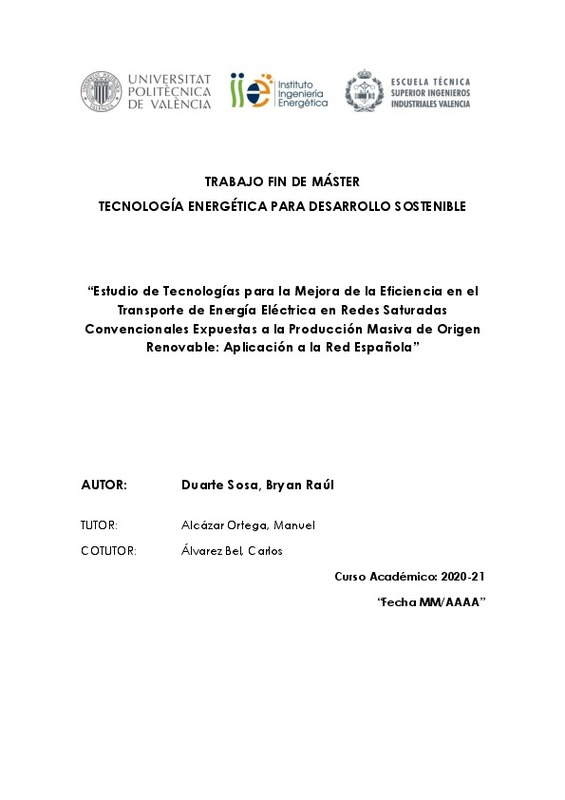|
Resumen:
|
[ES] El presente trabajo, tiene como finalidad el estudio comparativo de alternativas tecnológicas que den solución a las diversas necesidades que aquejan los Sistemas Eléctricos de Potencia (SEP) en la actualidad, en ...[+]
[ES] El presente trabajo, tiene como finalidad el estudio comparativo de alternativas tecnológicas que den solución a las diversas necesidades que aquejan los Sistemas Eléctricos de Potencia (SEP) en la actualidad, en especial aquellos problemas relacionados con el sector del transporte de energía eléctrica de manera eficiente y segura. Para ello, se realizará un modelo del sistema eléctrico español (donde se aplicarán las alternativas estudiadas) y se analizará el nivel de implantación tecnológica en éste. Asimismo, se analizará el impacto de utilización de diversas tecnologías emergentes en el campo de la gestión de los sistemas eléctricos, tales como los dispositivos flexibles de transporte de corriente alterna (FACTS) e implantación de enlaces de corriente continua en alta tensión (HVDC). Ello permitirá determinar la factibilidad técnica de su implantación para una mejor gestión del sistema, para lo que también se realizará el análisis de los beneficios técnicos, económicos y medioambientales que supone la consideración de nuevas tecnologías en redes, las cuales presentan en la actualidad una alta penetrabilidad de fuentes renovables intermitentes.
El presente estudio, analiza, interpreta y propone a través de su misma formulación, la aportación de un nuevo enfoque de control y gestión de la energía que se genera, transmite y consume en un SEP real, en un entorno donde se han desarrollado técnicas de generación de energía limpia, pero no tanto tecnologías ni de implantación en la red ni de nuevos métodos ni dispositivos tecnológicos de control flexible ante la naturaleza de las nuevas fuentes de generación. Esto consigue dar un valor notable a este estudio, pues hace una evaluación de un sistema saturado basado en tecnologías y técnicas de control convencionales y lo mejora a través de diversas propuestas tecnológicas basadas en la implementación de nuevos dispositivos que re-definen la forma de operar los sistemas de potencia, haciendo esta implantación tecnológica a distintos niveles de depuración técnica y pudiendo, de esta manera, representar un notable cambio en los SEP actuales.
[-]
[EN] The purpose of this work, is the comparative study of technological alternatives that provide a solution to the various needs that currently affect the Electric Power Systems (SEP), especially those problems related ...[+]
[EN] The purpose of this work, is the comparative study of technological alternatives that provide a solution to the various needs that currently affect the Electric Power Systems (SEP), especially those problems related to the electric energy transport sector in an efficient and safe manner. For this, a model of the Spanish electricity system is made (where the alternatives studied will be applied) and the level of technological implementation in it, will be analyzed. Likewise, the impact of the use of various emerging technologies in the field of electrical systems management will be discussed, such as flexible alternating current transport devices (FACTS) and the implementation of high voltage direct current links (HVDC). This will make it possible to determine the technical feasibility of its implementation for a better management of the system, for which an analysis of the technical, economic and environmental benefits of considering new technologies in networks will also be carried out, which currently present a high penetrability of intermittent renewable sources.
The present study analyzes, interprets and proposes, through its same formulation, the contribution of a new approach to control and management of the energy that is generated, transmitted and consumed in a real SEP, in an environment where techniques of generation of clean energy, but not so much technologies or implementation in the network or new methods or technological devices for flexible control given the nature of the new generation sources. This manages to give a remarkable value to this study, as it makes an evaluation of a saturated system based on conventional control technologies and techniques and improves it through various technological proposals based on the implementation of new devices that redefine the way of operating. power systems, making this technological implementation at different levels of technical debugging and may, in this way, represent a notable change in current SEPs.
[-]
|







